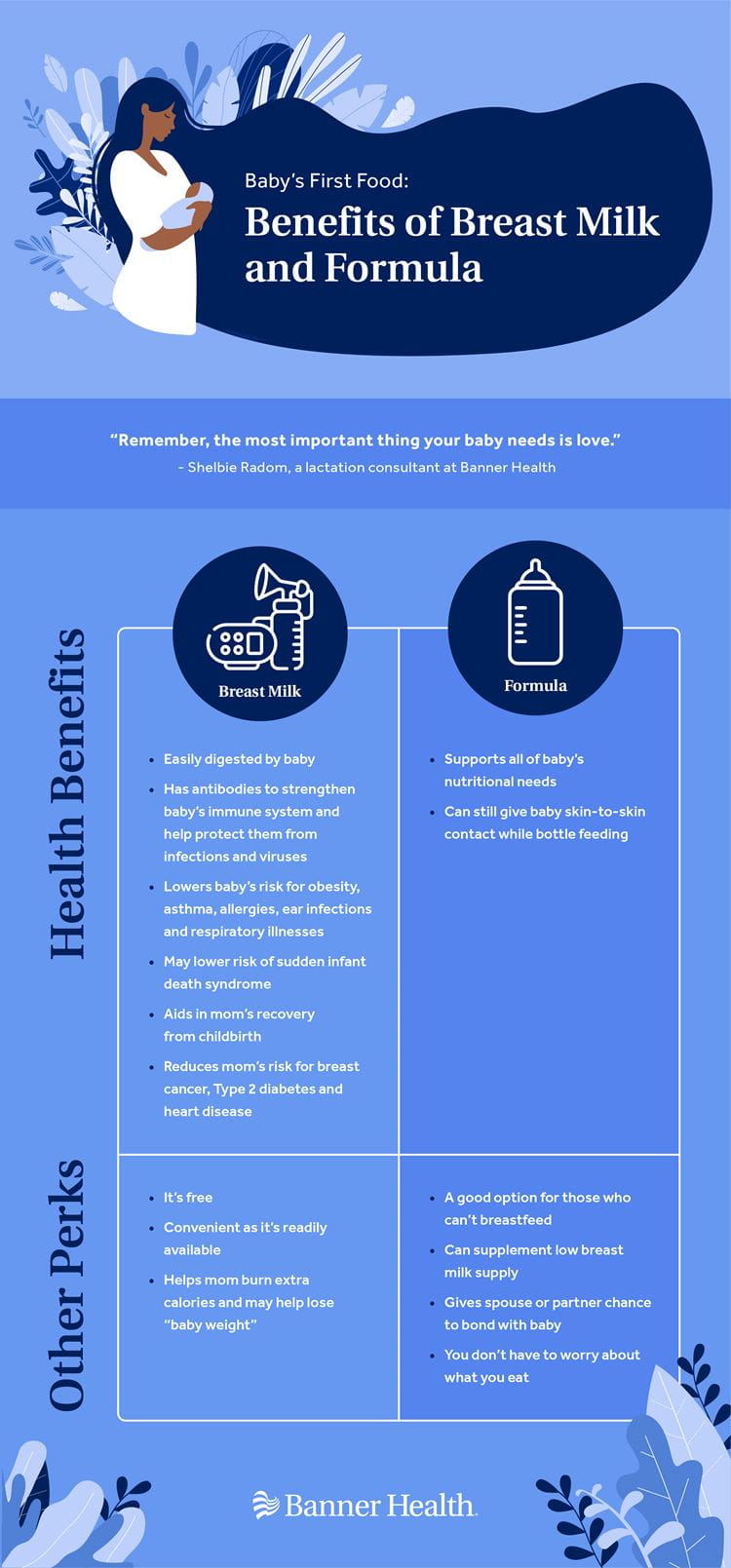To breastfeed or formula feed? That is a question that many expectant and new parents struggle with.
With so many societal pressures and unique situations at play, you may have a case of “mommy” guilt when it comes to making this decision.
But, know this: There is no “right” choice when it comes to breastfeeding or formula feeding your little one. Both methods have their advantages, and you’ve got to find what’s best for your growing family and lifestyle.
Check out the advantages of breastfeeding and formula feeding in the infographic below and get a deep dive into both with helpful feeding tips.
Advantages of Breastfeeding Baby
After giving birth, your body will naturally start producing breast milk, also called ‘liquid gold.’
“It’s coined this term, because it contains the perfect combination of nutrients to help babies gain the right amount of weight, help their little brains develop, and it is easier for their little stomachs to digest,” said Banner Health lactation consultant, Shelbie Radom, RN, at Banner McKee Medical Center. “Breast milk also contains antibodies that strengthen their immune system to fight off infections and viruses. And studies have shown breastfeeding lowers baby’s risk for asthma, allergies, ear infections and respiratory illnesses.”
The American Academy of Pediatrics along with many other medical experts recommend that babies should be breastfed for the first six months of life and encourage moms to continue until their baby is one year old or as long as mother and child are willing.
While breastfeeding is great for baby, it’s also good for mom—helping her recover quicker from childbirth and reducing her risk for certain health conditions.
“When a mother breastfeeds, her uterus contracts which helps it shrink back to its normal size and decreases bleeding after birth,” Radom said. “Breastfeeding also burns more calories which has been linked to helping women lose their pregnancy weight quicker—which is always a bonus. Studies have also shown it can reduce a woman’s risk of breast cancer, diabetes and heart disease.”
Breastfeeding can also make life a little easier for mom and baby, because it requires no prep time and is always free—saving parents money and trips to the store for formula.
Formula-Fed Baby
You may already be aware of the benefits of breastfeeding, but what if it’s just not possible? Have you recently adopted or used a surrogate? Are you struggling to produce enough milk or can’t breastfeed because of a medical condition?
Whatever your reasoning, don’t feel guilty. Formula feeding is also a healthy choice for babies. If you use a formula, your baby will get the best possible alternative to breast milk.
Formula feeding is also flexible, meaning that parents can arrange an infant-feeding schedule. This also allows your partner to help out with nighttime feeding and share that bonding time with the baby.
Can You Do Both?
Whatever you decide is the right choice for your family, know that it doesn’t have to be one way or the other.
If you planned on formula feeding, you may still consider breastfeeding the first couple weeks. The first food your breasts make is colostrum, a yellow fluid that contains antibodies and white blood cells that help your baby build a strong immune system.
“We actually see many mothers who were not going to breastfeed at all choose to give colostrum after being educated on its protective benefits and then switch to formula after,” Radom said.
If you planned on breastfeeding exclusively, and it doesn’t go as planned, know that it’s okay if you supplement with formula too.
“First, know that baby has to eat—no matter what method,” Radom said. “I find that many mothers are surprised when I tell them that breastmilk and formula can be mixed. They like knowing that at least they are giving their baby a little breastmilk. Every pregnancy and every baby is different. The most important thing your baby needs is love.”
Breastfeeding Tips
- Consult with a lactation consultant who can work with your goals. Lactation consultants go through intensive training to become certified so they can help assess a mother’s physical, mental and psychological state while also helping hands-on to make sure babies are feeding and mothers are supported and confident.
- Pumping can be crucial to establish a milk supply. If mom and baby are separated (e.g., baby needs to be in the neonatal ICU), then it’s very important that you start pumping as soon as possible to establish and maintain a milk supply. Pumping can also be helpful if you are concerned about a low milk supply or a decrease in milk supply. If you have concerns, speak with a lactation consultant as soon as possible.
- For additional support, visit the IBCLC website to find a lactation consultant in your area. Or check out our Banner Health lactation support classes and services.
Formula-Feeding Tips
- Snuggle up. Whether breast or bottle, skin-to-skin and eye-to-eye contact is important for your baby’s brain development and attachment. Nestle baby close to you, take your time and talk, sing or coo to your little one.
- Don’t switch formulas too often. Babies stomachs can’t handle constant formula changes.
- Consult with your baby’s pediatrician if you believe they have an allergy to the formula. Although rare, a pediatrician can help advise on a different formula.
Just like with anything in life, to breastfeed, formula feed or a combination of the two is simply a choice. Whichever method best suits your life is the right decision for you, your family and your baby.
If you’re expecting or recently had a baby, you are bound to have plenty of other questions and concerns. Check out the parenting section of our Banner Health blog for helpful advice and tips for raising a happy and healthy child.



